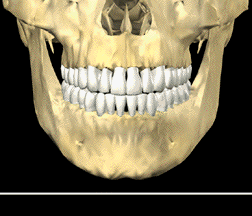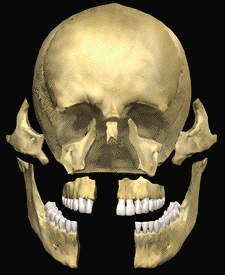At your consultation, you will spend time with the doctor reviewing all information related to your personal situation so you are able to make a good decision regarding the care you need. We will review all reasonable options and how you will be kept completely comfortable during your procedure.
What Are Wisdom Teeth?
Wisdom teeth are also referred to as third molars. They are the molars at the very back of the mouth. If the jaws have enough room, the third molars will typically erupt around the age of 18.
Do I have room for my wisdom teeth to erupt normally?
Probably not. Only a small percentage of patients have adequate space in their jaws for the wisdom teeth to erupt normally. This is due to a number of genetic and developmental factors and can be determined by checking radiographs and examining you during your consultation.
When is the best time to evaluate and treat impacted wisdom teeth?
In my perfect world, I would see every patient around the age of 16 to evaluate their third molars. By treating the problematic third molars early, complication rates can be greatly reduced. Younger patients also tend to heal faster and have fewer post-operative problems than older patients. After the age of 25, around half of the patients will have bone loss by their good second molars caused by the wisdom teeth
What does Impacted mean?
An impacted tooth is simply a tooth that has not erupted into a normal position. A significant majority of wisdom teeth do not erupt fully do to inadequate spacing.

What problems may occur if I leave my wisdom teeth in place?
There are multiple problems which may develop related to wisdom teeth. The following are the most important:
- They can cause infection and gum disease causing pain and in some cases require hospitalization
- They can damage the good second molar teeth by putting pressure on them to the point the good teeth begin to melt away
- They can increase the probability that cavities will form on the back of the second molars
- They can cause problems with the way the teeth fit together
- They can have cysts form around them melting away bone and causing damage to the jaw and other teeth
- In some patients, they can cause problems with the eruption of the second molars
There are some teeth which are best left in place if the benefits are exceeded by the risks. This will be reviewed thoroughly at your consultation visit. If they are left in place, at a minimum, yearly evaluation by your dentist is necessary with prompt referral at the first sign of a progression of symptoms or changes on examination. Remember, by the time it hurts, there is usually already damage to the second molar teeth or surrounding bone.
What does wisdom tooth removal involve?
After a thorough consultation, you will be scheduled for a surgical appointment. It is generally recommended that anesthesia be used to allow you to sleep through the procedure. This will ensure the best and most comfortable experience possible. You need to have a responsible person take you home afterwards. Generally, you will rest and avoid strenuous activity for several days after your procedure.
How long will I need to be out of work or school?
Generally, the day of surgery and two days afterwards will be fine. If you do very strenuous work or if your teeth are very difficult, an extra day may be needed.
How much will it Hurt?
Most websites won’t address this but we think it is a very fair question. You will have numbing medicine in place with you leave the office after your procedure. It will generally last from 8-12 hours to aid in reducing discomfort. You will have pain medicine specific to you needs typically including an anti-inflammatory and a narcotic. We usually administer a steroid to aid in reducing swelling and soreness as well. All patients are counseled to use cold compresses to reduce inflammation, soreness, swelling and muscle stiffness.
*See the post-operative instruction section also. It will give you all the information related to the necessary post-operative care.
For minor procedures, local anesthesia is all that is usually necessary. When more extensive procedures are planned or when a patient is very anxious, sedation or general anesthesia is often indicated. Dr. Beaty has the training, licensure and experience to deliver the best anesthesia techniques for your specific needs.
These anesthesia services are provided to you in an environment of optimum safety, utilizing modern, state of the art, monitoring equipment and staff members certified in oral and maxillofacial surgery/anesthesia assisting.
Oral and maxillofacial surgeons are the only specialty surgeons in medicine or dentistry that are trained and separately licensed in the administration of general anesthesia. Dr. Beaty re-certifies every two years in Advanced Cardiac Life Support.
At your consultation appointment, your medical history will be thoroughly reviewed and proper anesthesia and pain control protocols will be established to fit your needs. Please have a full listing of your medications, allergies and past medical history to aid us in keeping you safe and comfortable.
Orthognathic surgery is needed when jaws don’t meet correctly and/or teeth don’t seem to fit in the jaws.
Teeth are straightened within the jawbone with orthodontics, and corrective jaw surgery repositions misaligned jaws. This not only improves facial appearance, but also ensures that teeth meet correctly and function properly.
People who can benefit from orthognathic surgery include those with an improper bite or whose jaws are positioned incorrectly. Jaw growth is a gradual process, and in some instances, the upper and lower jaws may grow at different rates. The result can be a host of problems that can affect chewing function, speech, long-term oral health, and appearance. While, orthodontics alone can correct many bite problems when only the teeth are involved, orthognathic surgery may be required if there is a skeletal discrepancy.
Before any treatment begins, a consultation will be done to perform a complete examination with x-rays. During the pre-treatment consultation process, feel free to ask any questions that you have regarding your treatment. When you are fully informed about all aspects of your care, you and your dental team will make the decision to proceed with treatment together.
Dr. Beaty uses modern computer techniques and three dimensional models to show you exactly how your surgery will be approached. Using comprehensive facial x-rays and video stills, he can show you how your bite will be improved and even give you an idea of how you will look after surgery. This helps you understand the surgical process, the extent of the treatment prescribed, and to see the benefits of orthognathic surgery.
If you are a candidate for corrective jaw surgery, Dr. Beaty will work closely with your orthodontist during your treatment. The actual surgery can move your teeth and jaws into a new position that results in a more attractive, functional and healthy dental-facial relationship.
Oral and Maxillofacial Surgeons are uniquely qualified to manage and treat Facial Trauma. Dr. Beaty also practices at area hospitals and provides emergency room coverage for facial injuries including:

- facial lacerations
- lip lacerations
- intra oral lacerations
- fractured teeth
- avulsed (knocked out) teeth
- fractured facial bones (upper and lower jaws, cheekbones, eye sockets)
